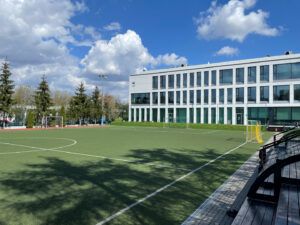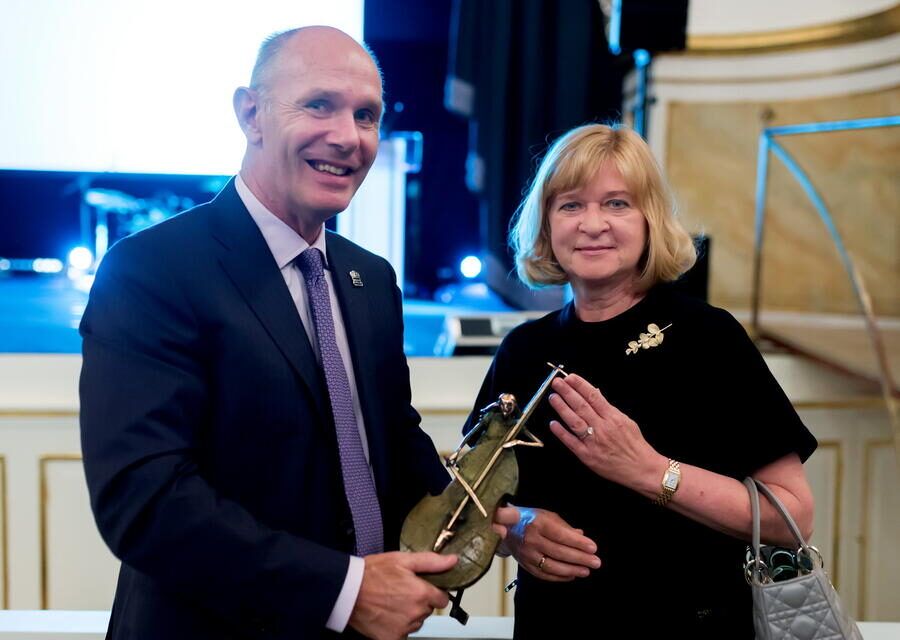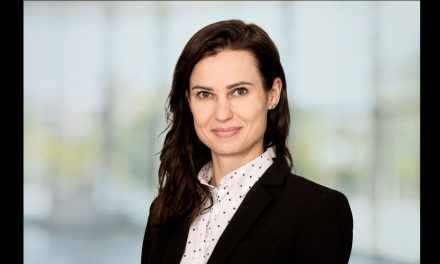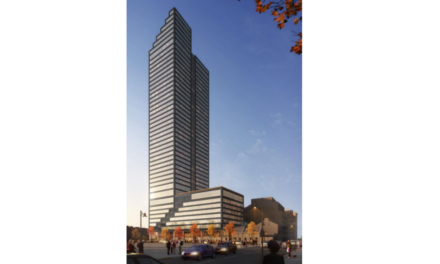School Founder, Mrs Iwona Thomas with NAE CEO, Mr Andrew Fitzmaurice
Iwona Thomas, School Founder and Business Director at The British School Warsaw, talks to the BPCC’s Michael Dembinski about the school’s thirty years of existence

What were some of the biggest hurdles that you had to overcome when you were establishing The British School Warsaw in 1992?
I was very enthusiastic about the idea of opening a British school in Warsaw and the initial problems experienced were expected by me. Obviously, securing the school building was a great challenge as was opening the accounting books for the new company, let alone finding an accountant. I was the only employee in the school to start with, so the matters I was dealing with ranged from contracts for the lease, employment and enrolments to cleaning the floors and finding an electrician. However, I was very proud to open the doors to the first 35 pupils on 1 September 1992. Nord Anglia Education supported me with providing the educational staff which was extremely important.
The British School Warsaw was the very first Nord Anglia Education school outside of the UK; its establishment was a significant step in turning what was then just a UK-based language school into a global group with 81 schools around the world. How did that happen?
 My husband came to Poland as an expat, opening and running an international group subsidiary in Warsaw. He and I decided to establish an English curriculum-based school, as there was at that time no British education provision in Warsaw for our children. We knew we would need help so my husband wrote to the Independent Schools Association in the UK asking if any of their members would work with us in creating and running the School. Nord Anglia Education responded, and their senior management came to Warsaw to discuss with us how we would establish the operation. In fact, at that time, Nord Anglia Education had a significant group of private day-schools in England, and so had notable experience and the infrastructure to help us. Warsaw was the first overseas school the group was involved in and our successful partnership initially with Kevin McNeany, the then chairman, then Mr Fitzmaurice the group CEO for the past 20 years, became a model the group followed elsewhere. For example, we were the first school in the group to provide the International Baccalaureate programme. Andrew was the real driver in focusing the group on British education schools internationally and building it out to its current world-leading position.
My husband came to Poland as an expat, opening and running an international group subsidiary in Warsaw. He and I decided to establish an English curriculum-based school, as there was at that time no British education provision in Warsaw for our children. We knew we would need help so my husband wrote to the Independent Schools Association in the UK asking if any of their members would work with us in creating and running the School. Nord Anglia Education responded, and their senior management came to Warsaw to discuss with us how we would establish the operation. In fact, at that time, Nord Anglia Education had a significant group of private day-schools in England, and so had notable experience and the infrastructure to help us. Warsaw was the first overseas school the group was involved in and our successful partnership initially with Kevin McNeany, the then chairman, then Mr Fitzmaurice the group CEO for the past 20 years, became a model the group followed elsewhere. For example, we were the first school in the group to provide the International Baccalaureate programme. Andrew was the real driver in focusing the group on British education schools internationally and building it out to its current world-leading position.
Was it generally easier back in 1992 to set up a school in terms of all the different permits, paperwork, inspections and so on? Did you still feel the oppressive bureaucratic atmosphere of the old system? There is a notion that the early 1990s were a golden era for setting up new businesses in Poland – is that correct? Would it be easier or harder to do it all again today?
It was difficult to set up a British-style education school employing foreign teachers fully registered with the Polish authorities, as it was a pioneer idea in the market. However, I met some very open-minded and supportive representatives of various government institutions who were positive about the political and economic changes that were taking place in Poland at that time. I do not think that at any time it was or is an oppressive bureaucratic atmosphere. We’ve always found our cooperation with the Government institutions to be professional and supportive. Opening a similar school in Warsaw now would be difficult as the competition is greater. There was no British school in Warsaw when we opened in 1992, our school has been settled in the Polish market for the past 30 years and educates around 1,200 pupils. I am very happy that we can provide a high standard of education to so many children, it is a great privilege.
The early days of Poland’s economic transformation required many expat managers to run newly privatised firms; Poland was still seen as a hardship posting and expat packages had to be generous to encourage managers to come here with their families. These packages often included education for managers’ children. To what extent was this a significant factor in the early successes of The British School Warsaw?
The early ‘90s was an amazing time for the global economy with Central Europe opening up to new opportunities, top Western managers coming to Poland to set up new businesses, branches of big corporations and companies looking for new offices and employees. There was so much enthusiasm and positive energy in the Polish nation and from our business partners abroad.
 This atmosphere was reflected in the school. Our parents wanted us to succeed and for the school to be a success as in doing so they were securing the education for their children. They knew that they, as well as their successors, were here for years to come, based on the fact that their businesses in Poland were beginning to be extremely successful and were expanding fast. I will never forget the amazing community that was in the school, it really felt like one big family. Naturally the school became a centre of support for most of the parents who lived in Warsaw without their extended families. Finding accommodation, an English-speaking doctor or shopping with a limited supply of everyday necessities was not easy and the support that the school families provided for each other was invaluable. Amazing friendships developed in the following years, and I am very grateful to the parents-pioneers who believed in our newly-opened school. Although the school grew from the initial 35 students to 1,200 students, we’ve managed to preserve a strong and dedicated community here. Our outstanding Parent Teacher Association, right up until today, continues to be a crucial element of the school’s working in partnership to enhance our children’s learning experience and to connect our families through social events and charitable causes.
This atmosphere was reflected in the school. Our parents wanted us to succeed and for the school to be a success as in doing so they were securing the education for their children. They knew that they, as well as their successors, were here for years to come, based on the fact that their businesses in Poland were beginning to be extremely successful and were expanding fast. I will never forget the amazing community that was in the school, it really felt like one big family. Naturally the school became a centre of support for most of the parents who lived in Warsaw without their extended families. Finding accommodation, an English-speaking doctor or shopping with a limited supply of everyday necessities was not easy and the support that the school families provided for each other was invaluable. Amazing friendships developed in the following years, and I am very grateful to the parents-pioneers who believed in our newly-opened school. Although the school grew from the initial 35 students to 1,200 students, we’ve managed to preserve a strong and dedicated community here. Our outstanding Parent Teacher Association, right up until today, continues to be a crucial element of the school’s working in partnership to enhance our children’s learning experience and to connect our families through social events and charitable causes.
I remember a tipping point around 2001, 2002 and the global economic slowdown caused by the bursting of the first dot.com bubble. It was a moment when many international corporations decided to send their expat managers home and replace them with a new generation of young Polish managers who by then had gained a decade’s experience working in a free-market economy. Their packages no longer included education for their children in schools originally set up for expats. How did that affect The British School Warsaw?
The process of Polish specialists taking over company positions from the expat management was an inevitable transition which did not really affect the school. The distribution of the nationalities changed from a majority of UK and Dutch to a broader mix of parent nationality. Some Polish families also decided to send their children to our school.
 What is the balance today in terms of The British School Warsaw’s pupils? How many are children of British expats, how many of expats from other countries, and how many are Polish?
What is the balance today in terms of The British School Warsaw’s pupils? How many are children of British expats, how many of expats from other countries, and how many are Polish?
Over 60 nationalities are represented in our school community today, which guarantees a unique diversity, openness, and internationalism to us all in The British School Warsaw. It is a wonderful opportunity for us to learn from other cultures and their experiences and to respect our differences.




























